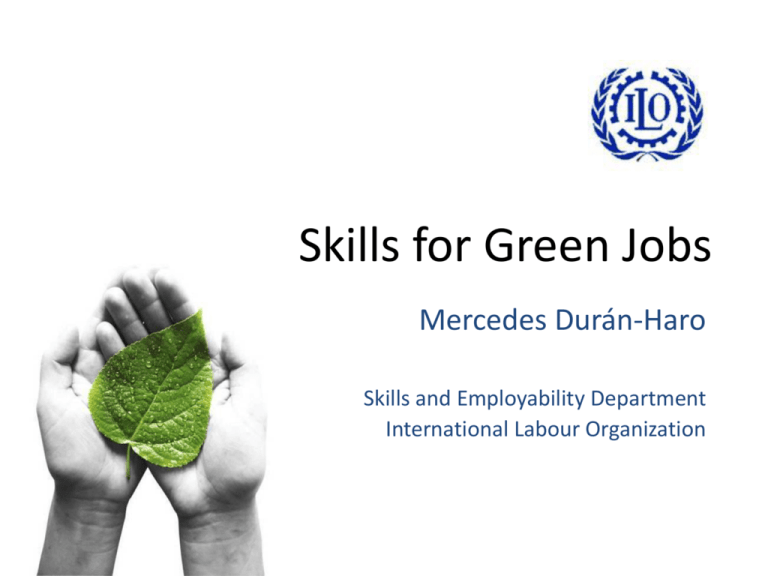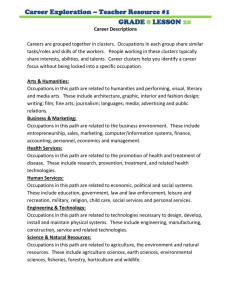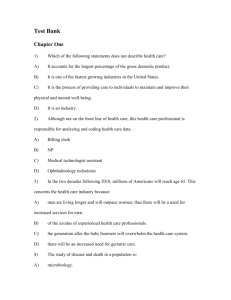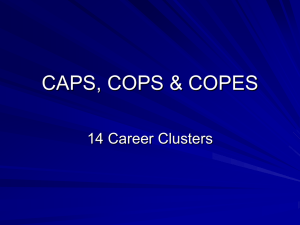The challenge of meeting new skill needs as part of mitigation and
advertisement

Skills for Green Jobs Mercedes Durán-Haro Skills and Employability Department International Labour Organization ILO framework for skills development • In 2008, ILC Conclusions on: “Skills for improved productivity, employment growth and development” • For the green economy: – Meet new skill needs as part of mitigation and adaptation efforts – Support a fair transition to more sustainable production – Sustain a dynamic development process: Adjust training supply to demands of new technologies, products, energy efficiency, etc. Research projects • ILO-Cedefop study: “Skills for Green Jobs. A global View” Forthcoming. • On-going Joint project ILO-EC: – Methods of Identification of skill needs – Occupations & skills in renewable energy – Occupations & skills in green building End of the project July 2011. All part of the Green Jobs Program of the ILO Drivers of skills change • Change in the natural or build environment (for instance in agriculture, adapting workers’ skills to prolonged dry or rainy seasons) • Policy or regulation • New technologies • Markets for green industries (competitive advantage) and consumer habits Green structural change • Additional jobs will be created. • Some employment will be substituted • Certain jobs may be eliminated without direct replacement • Many existing jobs will be redefined • New jobs created will offset those lost • But those who will get green jobs are not necessarily those who will have lost their jobs Navarre’s successful shift to renewable energies (Spain) End 2010, Navarre : • produced 65% of electrical energy consumption from RE sources, • had the second lowest unemployment rate in Spain • was the first region to have a positive GDP growth rate after the crisis Green building – core occupations • Research on 32 countries –including 19 European • A wide range of existing occupations are affected, but in some cases new occupations are created • Core occupations grouped in 6 different occupational clusters along the value chain Green building – skill needs Technical skills • environmental regulations, schemes etc. • understanding of the environmental, social, economic issues to design effective policies • passive design & RE in buildings • energy efficiency analysis • water conservation techniques • insulation techniques • Solar PV and thermal systems installation and maintenance • recycled materials • upgrade and replacement HVAC systems • preventive maintenance, etc. Soft skills •environmental awareness •innovation and leadership •interdisciplinary skills and team work •risk management •understanding market needs •communication •analytical skills •marketing skills, etc. Skills and occupational changes • A wide range of existing occupations are affected, but in some cases new occupations are created • The impact on skills needs can be quantitative and/or qualitative • Generic and core skills are equally important Skills shortages already pose a major barrier to green transitions and job creation Training response At different levels: • Enterprise level response • Industry response (associations of employers, sector skills councils, joint bipartitie or tripartite initiatives) • Government solutions come mostly through the formal education and training system • Universities usually responsive, private and public • NGOs and donors deliver skills where formal systems don‘t reach out – mostly developing countries. • Stronger in higher education and weaker in TVET Policy coherence: The case of France: A comprehensive policy framework Grenelle de l’Environnement government, unions, employers, NGOs and local authorities. Social dialogue!! – National Strategy for Sustainable Development 2009-2012 where training is included!! – Mobilization Plan for Green Jobs •Eleven Sectoral Committees: analysis on skills and training needs in the green economy •Collaborative work between stakeholders at all levels Coordination!! Some general conclusions • The green change is happening identification of skills needs and adequate provision of skills are required • The success in response measures depends on: – policy coherence and the inclusion of a training component in policies for greening – coordination among various actors and levels: social dialogue!! http://www.ilo.org/skills/ Thank you for your attention! Mercedes Durán-Haro ILO Skills and Employability Dept, duran@ilo.org











